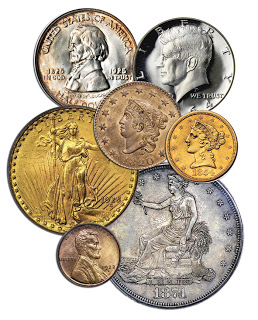
Test your knowledge on these five questions, and see how you do, a little numismatic IQ:
1. If you want to find a sailing ship on a state-reverse quarter dollar, a good place to look is on this type:
a: 2000 <state w:st="on"><place w:st="on">New Hampshire
b: 1999 <state w:st="on"><place w:st="on">New Jersey
c: 2001 <place w:st="on"><state w:st="on">Rhode Island
d: 2002 <state w:st="on"><place w:st="on">Indiana
2. Which one of these statements is correct?
a: To complete a set of one $5 gold piece from each mint in 1854, you will need to get five coins.
b: The 1804 silver dollar is rare today because most were sent to <city w:st="on"><place w:st="on">Tripoli to pay American sailors, and the ship was lost en route.
c: Frank Gasparro designed the obverse of the 1964 Kennedy half dollar.
d: Dr. George French, of <city w:st="on">Rochester, <state w:st="on">NY, is primarily remembered today for his remarkable collection of Civil War tokens from <city w:st="on"><place w:st="on">Cincinnati .
3. Which one of these statements is not correct?
a: The Clemy Award, the highest honor of the Numismatic Literary Guild, takes its name from a Latin designation for a species of turtle.
b: <country-region w:st="on"><place w:st="on">Col. </country-region> Bill Murray’s “New-Mismatist” is designed for newcomers to the hobby, and has been popular for a long time.
c: Dr. Henry Linderman, one-time director of the Mint, enjoyed having the Mint strike rare patterns for his personal collection.
d: If you encounter a <place w:st="on"><placename w:st="on">Mint <placetype w:st="on">State 1820 copper cent today, the chances are good that it came from the famous Randall Hoard.
4. Which one if these mintmarkless coin varieties was struck at the San Francisco Mint? (Someone forgot to add the mintmark to the dies!)
a: 1874 trade dollar.
b: 1922 <place w:st="on"><city w:st="on">Lincoln cent.
c: 1928 $20 gold.
d: 1925 <place w:st="on"><placetype w:st="on">Fort <placename w:st="on">Vancouver commemorative half dollar.
5. In Mint records what we in numismatics call a wire rim or, as Walter Breen sometimes said, a knife rim, was often referred to as a:
a: Fluff.
b: Scissel.
c: Fin.
d: Brillig.
Answers: 1-c, 2-a, 3-a, 4-d, 5-c





